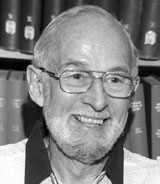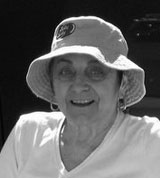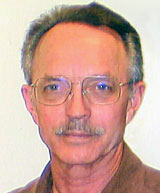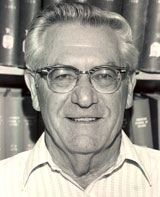Volume 26 · Number 2 · Winter 2009
In Memoriam

Fredrick Addicott

Crystie Halsted

Robert Scibienski

John Tucker
Fredrick Addicott, a botany professor in 1961-77 and a longtime docent at the UC Davis Arboretum, died in September at his Davis home. He was 95. He was an authority on abscission, the process by which plants shed their leaves and fruits. He led a UC Davis research group that identified abscisic acid, a hormone that allows plants to adapt to stress.
Yuri Druzhnikov, a UC Davis Russian professor since 1989 and a leading emigre author who was blacklisted in his homeland until the 1991 collapse of the Soviet Union, died in May at his Davis home. He was 75. His novel, Angels on the Head of a Pin — published in New York after the manuscript was smuggled out of Russia — was hailed by the University of Warsaw in 1999 as one of the 10 best Russian novels of the 20th century and was included on a UNESCO list of world-literature masterpieces. In 2001, Poland nominated him for the Nobel Prize in Literature. His other works include nonfiction books Informer 001 or the Myth of Pavlik Morozov and Prisoner of Russia: Alexander Pushkin and the Political Uses of Nationalism and novels Passport to Yestersday, Madonna from Russia and, published in Russian and Italian just a month before his death, The First Day of the Rest of My Life. He also portrayed a writer, Daniel, in the film, Prisoner of Time, about Russian dissident intellectuals living in the U.S. after the end of the cold war. More . . .
George "Skip" Gay, an associate professor of anesthesiology in 1989-2003, died in February in Anchorage, Alaska, after a short illness. He was 77. Before joining the faculty, he pioneered treatment of drug abuse at San Francisco's Haight-Ashbury Free Clinic and founded Rock Medicine with promoter Bill Graham to care for ailing concert goers. For the last five years, he worked in Valdez, Alaska, where he was the only anesthesiologist within a 100-mile radius. More . . .
Crystie Halsted, a pioneer in treating AIDS and other infectious diseases in children, died in September at UC Davis Medical Center after a long illness. Her death came a week before her 72nd birthday. She was one of only a few women on the medical school faculty when she joined the pediatrics department in 1973-74. She received a Kaiser Award for Excellence in Teaching Clinical Sciences in 1977. In 1992 the Sacramento History Center gave her a Women in History Award for her work with impoverished, abused and neglected children. Two years ago, the pediatrics department renamed its Pediatric Award for Excellence, which is given to a graduating senior student, the Crystie C. Halsted Award. More . . .
Samuel Hart '48, an agricultural engineering faculty member in 1952-70 who helped develop more environmentally sound ways of managing solid and agricultural waste, died in September at his Davis home. He was 85. He owned Davis Waste Removal in 1972-79.
Gordon King, an agricultural economics faculty member in 1957-90 who conducted award-winning research on agricultural marketing and consumer demand for food commodities, died of natural causes in September in Arnold at age 84. He was elected as a fellow of the American Agricultural Economics Association in 1983.
August "Gus" Maki, a professor emeritus of chemistry who helped develop spectroscopic methods for chemistry and biology research, died in Sacramento in October. A faculty member in 1974-94, he used phosphorescence and optically detected magnetic resonance spectroscopy to study proteins. In 2000, the International EPR Society elected him a fellow for his contributions to electron paramagnetic resonance spectroscopy. More . . .
Robert Károly Sarlós, who taught theatre history in 1963-93 and helped preserve both historic plays and playhouses, died in August in Portland, Ore. He was 77. Professor Sarlós took a lead role in creating UC Davis' dramatic arts doctoral program, which he directed for more than 20 years, helped Shields Library develop its performing arts holdings and directed seven productions, including a reconstuction of a 1634 masque The Triumph of Peace. He also was instrumental in the restoration of the historic Woodland Opera House. He contributed to 15 books and wrote more than 40 articles and reviews in scholarly journals. His book, Jig Cook and the Provincetown Players; Theatre in Ferment, was honored with the American Theatre Association's Barnard Hewitt Award for theatre history in 1983. More . . .
Robert Scibienski, a medical school faculty member in 1972-2002 known for his passion for teaching immunology courses and his sense of humor, died at his Woodland home in August. He was 64. His research focused on the chemistry of lysozyme — a bacteria-fighting enzyme found in egg whites, tears and saliva — as well as the immunology of breast cancer and the development of tumor-specific antibodies. More . . .
G. William Skinner, a professor emeritus of anthropology and a leading scholar of Chinese culture, died of cancer in October at his Davis home at age 83. A faculty member in 1990-2005, he was a member of the National Academy of Sciences and past president of the Association for Asian Studies. More . . .
John Tucker, an oak expert who helped cultivate two world-class UC Davis plant collections — one living and the other pressed and dried — died in July in Davis from complications of a stroke. He was 92. Professor Tucker served for 39 years as director of the J.M. Tucker Herbarium, now part of the UC Davis Center for Plant Diversity herbarium, a collection of more than 250,000 dried plant specimens. He also served as director of the UC Davis Arboretum for 12 years. In 1962, he established an oak grove near the western end of the arboretum. Today the arboretum has the greatest taxonomic diversity of any known oak collection. Dr. Tucker retired in 1986 but continued to give time and resources to the university. In 2001, he contributed $500,000 to support the growth and development of both the herbarium and arboretum. More . . .
